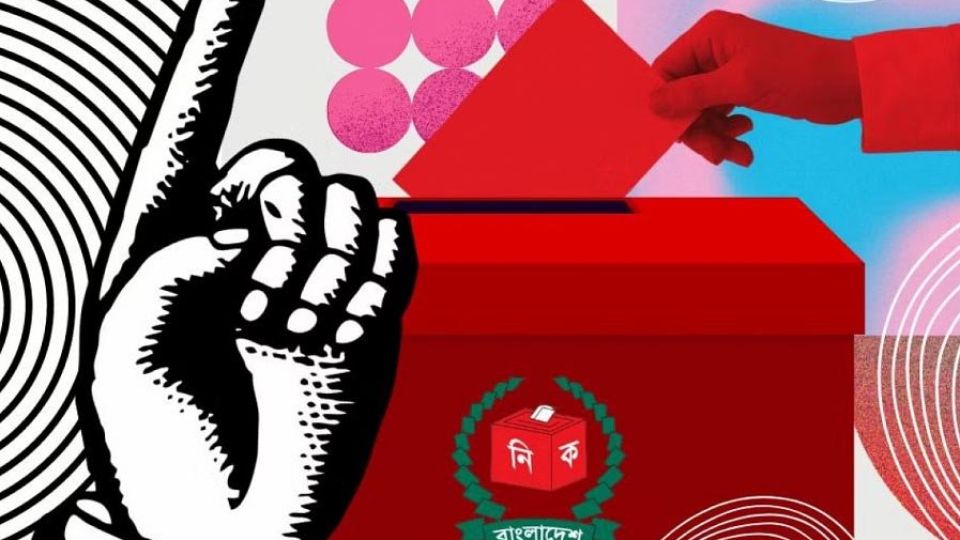Bangladesh’s election journey over the past decades has been quite a bumpy one. A part of this journey was interrupted by military regimes, and certain polls held under elected governments failed to uphold the principles of democracy, as they lacked credibility and competitiveness. The next election, too, seems to be heading in the same direction.

Theoretically, the Election Commission’s preparations are going as per law, and hence the ensuing election can be called legal. The question is, will it be a legitimate one? Sadly, the EC’s performance in holding recent by-elections as well as controversies surrounding the treatment of opposition parties and the registration of newly-formed parties and election-observing organisations raise questions about whether the EC is only concerned about the legal aspects of the election, disregarding all other concerns.
But should this most important institution target only this narrow goal? In a country like Bangladesh, where “democracy” is one of the high ideals of the constitution, institutions like the EC must play a distinctive role to ensure that the government is not abusing its power during or ahead of an election and manipulating the electoral process.
With about a month left to go before the election, it should be in full control of the administration at both national and local levels. Even though the commission is constitutionally mandated and empowered to do so, it seems to be quite reluctant to act upon that right now. We have seen how one questionable decision after another was taken right under the nose of the EC—decisions that can, and most likely will, influence the course of the national election come January.
Previously, one may recall that while little-known parties with no field existence got registration from the EC, some well-known parties, despite meeting the required criteria, did not. Needless to mention, two of the parties that were denied registration have been critical of the ruling party. The EC might have been legally correct and empowered to do what it did, but it failed to justify the legitimacy of its action.
Or recall the Lakshmipur-3 and Brahmanbaria-2 by-polls, which faced widespread allegations of irregularities in a case of election engineering. There was also the Dhaka-17 by-election held in July, which recorded only 11.5 percent voter turnout—the lowest in any by-election held in the last four years—once again laying bare that legitimacy has no place in EC’s dictionary.
A record Tk 1,600 crore will be reportedly spent for holding the 12th national election. The question is, what will the citizens get in exchange for this mammoth investment?
Over the last 15 years, we have had two controversial national elections, in 2014 and 2018, and a host of violent and badly supervised local government polls. In all these, voters were repeatedly frustrated, either because they couldn’t vote for their preferred candidates or because those didn’t participate or because the overall electoral environment was not ideal. The role of government departments and officers involved with the organisation of the elections was largely to blame for how things turned out. Will they play the same role this time? There are reports that members of the civil administration and law enforcement agencies are taking an openly partisan stance in favour of the ruling party.
So, when the EC takes the stance of conducting a self-styled participatory but non-inclusive and noncompetitive election, it will be in line with the law but assume the status of a biassed and illegitimate election. Politics surrounding the election seems to have gone back to square one, as the ruling Awami League and allied parties are gearing up for the election even though BNP and other opposition parties have totally rejected it. An election without legitimate or worthy alternatives and without the participation of the main opposition parties may still meet the legal criteria but it will be anything but an election.
As history has shown, such illegitimate elections receive varying degrees of support from internal and external players. The internal supporters are those who often benefit from hybrid-styled ineffective governance and the erosion of democratic structures. External support typically involves geopolitical entities with diverse interests. In the end, the public, who have never been a part of any kind of power structure, will end up shouldering the repercussions of an illegitimate election. In that case, there is a very high chance that Bangladesh could transition to more authoritarian governance, which will be disastrous.
This was first published in the Daily Star on 2 December 2023. Please click here to read on the site.